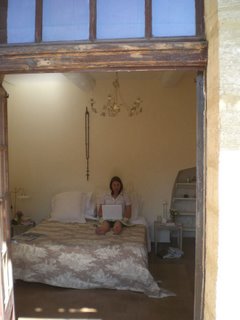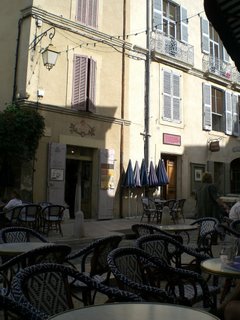
I'm writing this on Sunday, which is appropriate, since Sunday is one of the subjects.
Since I've been in France, all sorts of little things have occurred to me about the culture. I'm always interested in the small details when I travel: what's different about life here from the way it is at home? In a way these things interest me more than grand monuments and "must-see" sights. It's probably why food interests me so much, apart from the obvious reasons of appetite and greed.
Little things, small details of life, these are the things that make a person feel foreign. For example, in America, light switches work the other way around, toilets are very different and the portions in restaurants are mammoth. In Paris, the little man on the pedestrian crossing light is not a green man, standing with arms akimbo. Instead he's a stick figure, striding out with great purpose, as if indeed crossing the road.
After a few weeks in France we've gotten quite used to many of the quirks of life. Things like:
1. Sunday
Sunday, although this is not a religious country, is quite sacred. In rural Provence practically all the shops - including the local supermarket - are closed, and probably a good half of the cafes. Even in Paris the shops were closed. I like this, so long as I am prepared with food and wine in the fridge. It's as if everyone, from city sophisticate to country farmer is dedicating the day to the family and the home, instead of rushing around buying stuff. Monday is an extension of this, with a lot of shops, offices and attractions closing their doors. I guess this is so people can recover from their Sundays.
 2. Lunch
2. LunchLunch is very, very important. In our local town, Uzes, there really is no point going to town between 12 and 2.30 if you plan to do anything other than eat lunch. Everything apart from restaurants will be closed. I wholeheartedly approve of this dedication to taking time over this important meal; it appeals to the lush in me but also, as I've mentioned, I think this contributes to the French svelteness. Despite the fact that the meals are three courses with wine, the fact that they take their time, have a nice conversation, take a break -along with the obvious fact that we are not talking enormous portions here - helps them not to overeat. I sense a dietary theory forming.... if it hadn't already been done, dammit, I would write a book called French women don't get fat.
3. Bells
In our village (we call it "our village" now we've been here a week. We're locals now. Sandy has even taken to driving like a local, haring along the narrow streets and speeding up when he sees tourists loping casually across the road) the bells at the church and the mairie (town hall) both ring on the hour and half hour. The problem is, their clocks are ever so slightly different. So the first bells go off, by our calculations at about the right time, on the hour. Then about 4 minutes later, the other bells go off. At certain hours, like 7pm, there's another sequence after the seven strikes; three, then three, then three, then nine. We still have not been able to find out what this is all about. We have noticed though that it is the same in other towns as well, with the bells being out of synch. Church and state competing for people's attention, peut-etre? But I like the bells; I'm used to them now, and it means I really don't need a watch.
4. Street names
I must really do some research and find out why this is. Probably it has to do with the revolution; my guess is that after that they went around every town re-naming all the streets and getting rid of anything named after an aristo. The result is that every French town has the same street names, give or take a few local exceptions. There's always, always a boulevard, avenue or rue Victor Hugo, for example. Imagine having a street in every town named after you? That is some serious fame.There's often a Place des herbes; a Rue Gambetta, a Rue or place du 14 Juillet. It makes you feel at home in every town.
 5. The chair code
5. The chair codeI'd love to be in the outdoor cafe chair business in France. French cafes apparently all order their chairs from the same supplier. There are usually two types of chair per cafe. To the uninitiated, it would seem reasonable to sit at a nice table outside in the sunshine, and expect to be able to eat a little lunch. But non, it does not work this way. Some tables are only for les snacks; a sandwich, a coffee, a quick drink. Other tables are reserved for eating proper meals. Sometimes these tables are right next to each other, but you have to sit at the right table if you want to see le menu. We have learned to check the chairs before we take a seat. I like the co-operation between cafes in their choice of chairs. There may be three cafes in a square, and they will all have different coloured upholstery to determine which belongs to who. I can only speculate what would happen if a cafe owner decided to redecorate in colours too close to a neighbouring establishment.
6. Pain et Vin
Bread and wine are staples of French life. Bread - une baguette, typically, is served with every meal. It's the basis of breakfast; coffee, pain, beurre and confiture being the staple. I must say I've been enjoying this petit dejeuner, although I can't help feeling slightly worried that it's less healthy than my usual cereal, baked beans, or Vogels toast. I am in denial about the effect of the frequent breakfast pains au chocolat.
On the wine front, we have been amazed at the prices of wine in the shops. It is incredibly cheap. In the supermarket, the average price for a bottle of something completely respectable is between 2 and 3 euros. I gather wine is only very lightly taxed here, because it is such an essential of life. A lunchtime table at a cafe without a carafe of wine on it is an uncommon sight. The French are very big drinkers of Rose with lunch, a custom I have embraced wholeheartedly.
For me it's the tiny slices of life that add up to an impression of a place. In Cadenet we passed a fire station where a large group of firemen were sitting around a long table - set with crockery and wine - in front of the station, eating lunch. In Uzes as we ate tapas in the square we watched a young baker's apprentice in apron and true baker-boy cap stroll over to the cafe carrying several baguettes under his arm and give them to the owner of our cafe. Later we slowed down to allow an immaculately dressed, grey-haired matron cross the road. She smiled and gestured her thanks, and as she passed I noticed she wore fabulous, bright red, high-heeled shoes. Cheers to that.
No comments:
Post a Comment